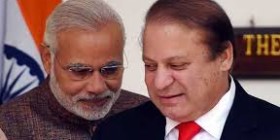‘The cooperation of Yakub with the investigating agencies after he was picked up informally in Kathmandu and his role in persuading some other members of the family to come out of Pakistan and surrender Constitute, in my view, a strong mitigating circumstance to be taken into consideration while considering whether the death penalty should be implemented,’ B Raman had written in August 2007.
With possibly days left for Yakub Memon’s hanging, Rediff.com secured permission from Mr Raman’s brother to publish the article.
In August 2007, writes Sheela Bhatt, I had written a two-part report: The strange case of Yakub Memon, and Why Yakub Memon’s death sentence is surprising.
Before writing it I had interviewed B Raman, former Additional Secretary in the Cabinet Secretariat, on the telephone as at that time he was based in Chennai and I in Mumbai. He was very critical about the story because when Yakub Memon was lured back to India, Mr Raman headed the Pakistan Desk at the Research and Analysis Wing, India’s external intelligence agency.
He was the key person who, along with officers of the Central Bureau of Investigation and the Intelligence Bureau, had put in best efforts to crack Yakub Memon and bring him to justice in India.
No less than Prime Minister P V Narasimha Rao had monitored the operation and was very pleased when the team met with success.
By all means it was an intelligence coup.
Mr Raman retired on August 31, 1994, just a few days after Yakub Memon was back in India. Yakub Memon claimed that he came to India on July 19, 1994, on his own while the Central Bureau of Investigation says he was arrested in New Delhi on August 5, 1994.
Mr Raman knew it all.
Mr Raman, who sadly passed away on June 16, 2013, had been a regular columnist for Rediff.com since 2002, and I requested him to share the inside story of Yakub Memon in the form of a column in 2007.
To my surprise, he agreed. But when the details arrived in my mailbox along with it came his note. In it he insisted that I should use the data in my reports without attribution. For my two-part story, lots of details had been given to me by Mr Raman and a former chief of the Intelligence Bureau who Mr Raman had suggested to me.
Mr Raman, image, left, was meticulous. He was an intelligence officer, but in some strange way he had a tremendous urge to ‘educate’ the people. He always treated media-persons including me as ‘pupils.’
Intelligence officers normally do not write e-mails to share secret details. But, after his retirement from R&AW, Mr Raman revealed his thoughts frequently through e-mail conversations. (In the final years of his life he was madly in love with Twitter, he was in fact addicted to it).
When Yakub Memon was sentenced to death Mr Raman was in pain. He called me to share why it was very wrong on the part of the Indian establishment to allow Yakub Memon to die by decree of law.
He was quite disturbed to see the deception by officers of the investigating agencies, in the Mumbai courts and in higher courts, that he was once part of. On August 2, 2007, at 9.39 am, I got Raman’s column in my inbox, written in bullet points and bold font, a style he was famous for. He sent it to me to publish in Rediff.com.
I was delighted. But, with the attachment, he also added, ‘I wrote this, but I am having second thoughts. Don’t use it. Others might escape as a result of this article if the higher court holds that the entire case has been vitiated as a result of the prosecution concealing a material fact from the sentencing court. R.’
Then, he changed his mind again and told me on the phone that I could use the details in my report. Obviously, I found the details useful.
Unfortunately, Mr Raman is no more. He died on June 16, 2013. But anybody who knew him enough can vouch that if he was alive today he would have written an article a day and would have gone on Twitter to stop Yakub Memon from going to the gallows.
Mr Raman’s argument was that while for Indians the country is bigger than anything else, a country can command respect only by honouring its commitments.
The promise given by serving officers who represent a sovereign State is not negotiable. The system should uphold what is promised by representatives of the sovereign State.
Even if the promise is given to doubtful characters like Yakub Memon who do not deserve our sympathy for running away from the motherland. Mr Raman argued, ‘By bringing back Yakub Memon the Indian State strengthened its standing.’
Mr Raman, who was a nationalist and supported patriotic issues, argued that the system of R&AW, IB and CBI worked wonders to bring back an Indian from an adversarial country like Pakistan. It was a historical intelligence achievement. Terrorists like Dawood Ibrahim and ‘Tiger’ Memon should not have been harboured by Pakistan in the first place. They must not be given protection for another day by any country.
Pakistan remains guilty of disregarding Indian sentiments by keeping Dawood Ibrahim under wraps. Indian diplomacy’s peace overtures have failed in bringing the terrorists to justice.
But, in the process of cracking the anti-India forces of Pakistan, Indian sleuths surprisingly got back Yakub Memon.
Yakub Memon, who has helped India prove a point, must be defended. In October 2006 Mr Raman had written an article (external link) on Parliament attack convict Afzal Guru, who was hanged in February 2013, advocating a deeper investigation of his case.
In reply to a query from reader Vijay Shankar, he had replied: ‘I have no views other than what I have already expressed. I have been of the view ‘kill them in action and not in custody, even after a fair trial, make the State-sponsor of terrorism bleed and differentiate the individuals who let themselves be used by it.’ Regards. Raman’.






Leave a reply